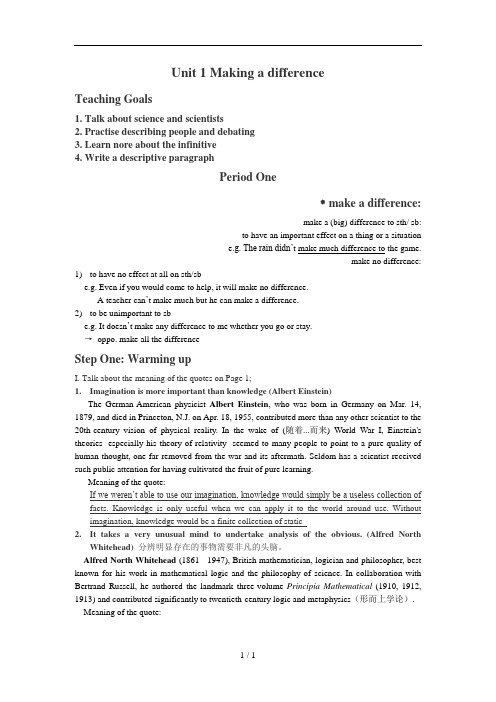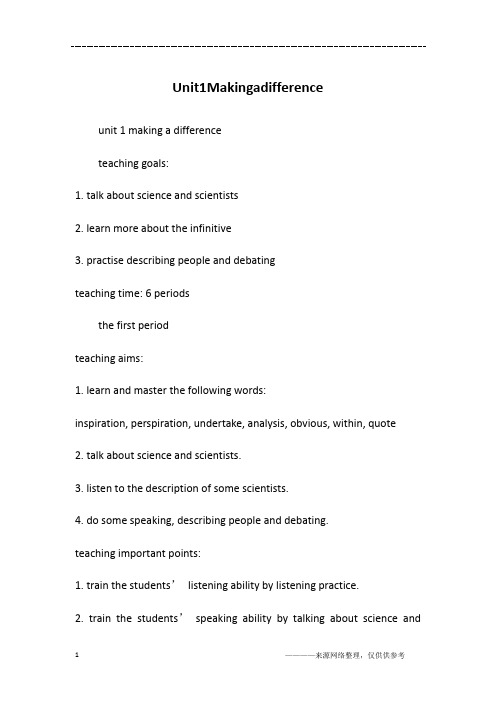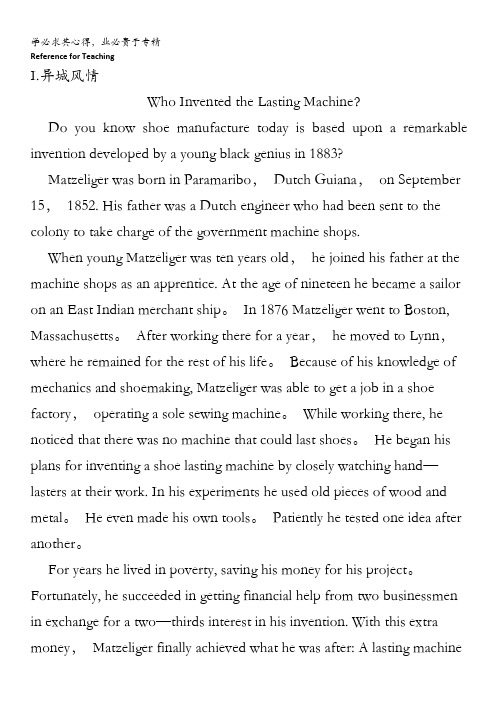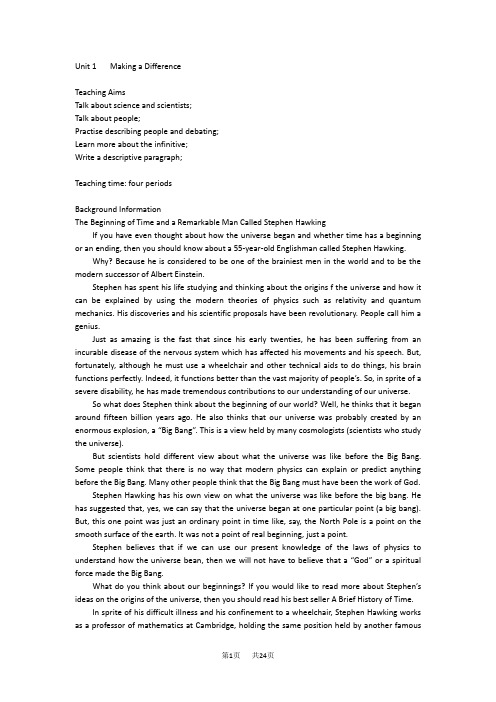Unit1Makingadifference(二)导学案[工作范文]
- 格式:docx
- 大小:18.52 KB
- 文档页数:9

Unit 1 Making a differenceTeaching Goals1. Talk about science and scientists2. Practise describing people and debating3. Learn nore about the infinitive4. Write a descriptive paragraphPeriod One﹡make a difference:make a (big) difference to sth/ sb:to have an important effect on a thing or a situationthe game..g. The rain didn’etmake much difference tomake no difference:1)to have no effect at all on sth/sbe.g. Even if you would come to help, it will make no difference.A teacher can’t make much but he can make a difference.2)to be unimportant to sbe.g. It doesn’t make any difference to me whether you go or stay.→oppo. make all the differenceStep One: Warming upI. Talk about the meaning of the quotes on Page 1;1.Imagination is more important than knowledge (Albert Einstein)The German-American physicist Albert Einstein, who was born in Germany on Mar. 14, 1879, and died in Princeton, N.J. on Apr. 18, 1955, contributed more than any other scientist to the 20th-century vision of physical reality. In the wake of (随着...而来) World War I, Einstein's theories--especially his theory of relativity--seemed to many people to point to a pure quality of human thought, one far removed from the war and its aftermath. Seldom has a scientist received such public attention for having cultivated the fruit of pure learning.Meaning of the quote:If we weren’t able to use our imagination, knowledge would simply be a useless collection of facts. Knowledge is only useful when we can apply it to the world around use. Without imagination, knowledge would be a finite collection of static2.It takes a very unusual mind to undertake analysis of the obvious. (Alfred NorthWhitehead) 分辨明显存在的事物需要非凡的头脑。

《Making a Difference》章节一:课程引入目标:让学生了解本节课的主题和目标,激发学生的兴趣。
步骤:1. 开场白:向学生问候,并简要介绍本节课的主题《Making a Difference》。
2. 提问:询问学生对“做出改变”的理解和经历,引导学生思考。
3. 展示图片:展示一些有关做出改变的图片,如志愿者活动、环保行动等,引发学生的兴趣。
章节二:词汇学习目标:让学生掌握本节课的核心词汇,并能够运用到实际情境中。
步骤:1. 展示词汇:向学生展示本节课的核心词汇,如“志愿者”、“环保”、“公益”等。
2. 词汇解释:对每个词汇进行解释,并给出例句,帮助学生理解和记忆。
3. 词汇练习:设计一些练习题,让学生运用所学词汇,如填空、选择题等。
章节三:听力理解目标:让学生能够理解英语听力材料,并能够进行简单的听力练习。
步骤:1. 听力材料:播放一段与“做出改变”相关的英语听力材料,如志愿者采访、环保活动报道等。
2. 听力练习:设计一些听力练习题,如填空、选择题等,让学生在听的过程中进行练习。
3. 讨论:听完后,引导学生进行讨论,分享自己的听后感。
章节四:口语表达目标:让学生能够用英语进行口语表达,并能够就“做出改变”的主题进行讨论。
步骤:1. 口语练习:设计一些口语练习题,如角色扮演、小组讨论等,让学生进行口语练习。
2. 话题讨论:引导学生就“做出改变”的主题进行讨论,鼓励学生发表自己的观点和经历。
3. 分享:邀请几名学生分享自己的口语表达,给予肯定和鼓励。
章节五:写作练习目标:让学生能够用英语进行写作,并能够就“做出改变”的主题进行写作表达。
步骤:1. 写作话题:给出一个与“做出改变”相关的写作话题,如“描述一次你做出的改变”。
3. 写作练习:让学生进行写作练习,给予学生一定的时间完成。
4. 评价:对学生的写作进行评价,给予反馈和建议。
六、阅读理解目标:培养学生阅读理解能力,让学生能够理解并概括文章主旨。

Unit1Makingadifferenceunit 1 making a differenceteaching goals:1. talk about science and scientists2. learn more about the infinitive3. practise describing people and debatingteaching time: 6 periodsthe first periodteaching aims:1. learn and master the following words:inspiration, perspiration, undertake, analysis, obvious, within, quote2. talk about science and scientists.3. listen to the description of some scientists.4. do some speaking, describing people and debating.teaching important points:1. train the students’listening ability by listening practice.2. train the students’speaking ability by talking about science andscientists, describing people and debating.teaching difficult points:1. how to improve the students’listening ability.2. how to help students finish the task of speaking.teaching methods:1. warming up to arouse the students’interest in science.2. listening-and-answering activity to help the students go through the listening material.3. individual, pair or group work to make every student work in class. teaching aids: 1. a multimedia 2.a tape recorder 3.the blackboard teaching procedures:step i warming up1.t: there are many outstanding scientists in the world, who made great contributions to society and science. now look at the pictures on page 1, tell me what are these scientists famous for?(bb) scientists contributionsmaria curie radium /poloniumalbert einstein the theory of relativity…2.t: well done. i think you are all interested in science and scientists. what do you think makes a successful scientist? have a discussion in pairs or groups of four. then report the results of your discussion.(it is the way he uses his tools that makes a successful scientist.a successful scientist must have much imagination and intelligence and he must be creative and hard-working.a successful scientist must be confident, curious and careful. but what i like to know is what made him/her interested in science…)t: now look at the quotes on page 1.do you know what they mean? and do you agree?天才就是百分之九十九的汗水加上百分之一的灵感。

Reference for TeachingI.异城风情Who Invented the Lasting Machine?Do you know shoe manufacture today is based upon a remarkable invention developed by a young black genius in 1883?Matzeliger was born in Paramaribo,Dutch Guiana,on September 15,1852. His father was a Dutch engineer who had been sent to the colony to take charge of the government machine shops.When young Matzeliger was ten years old,he joined his father at the machine shops as an apprentice. At the age of nineteen he became a sailor on an East Indian merchant ship。
In 1876 Matzeliger went to Boston, Massachusetts。
After working there for a year,he moved to Lynn,where he remained for the rest of his life。
Because of his knowledge of mechanics and shoemaking, Matzeliger was able to get a job in a shoe factory,operating a sole sewing machine。
While working there, he noticed that there was no machine that could last shoes。

Unit 1 Making a difference unit 1 making a difference section i 课前准备、听力、口语 1. genius is one percent inspiration and ninety-nine per- cent perspiration. 天才是百分之一的灵感加百分之九十九的汗水。(p.1 warming up 右图上) (1) genius天才,天资 [u];有天才的人[c] 如: ① genius is needed to solve the problem. 解决这个问题需要天才。② wuthering heights is one of the most extraordinary books that human genius has ever produced.《呼啸山庄》是人的天赋所创造出的是非凡的作品之一。③ shakespeare was a genius. 莎士比亚是个天才。 【短语】have a genius for... 在……方面有天赋。如: ① she has a genius for mathematics. 她有数学天赋。② your mother has a genius for managing such things. 你母亲在管理这些事情上很有天赋。 (2) percent = per cent百分之…… 如: ① ten percent of the pupils are absent today. 今天有10%的学生缺席。② fifty percent of the work has been finished. 50%的工作已经完成。③ i think it's ninety percent probable. 我想有90%的可能。 【注意】用percent构成的短语作主语时,谓语动词应根据of后的名词确定。 【拓展】per 意为“每……”。如: per day 每天 / per week 每周 / per pound 每镑 / per person 每人 2. it takes a very unusual mind to undertake the analy- sis of the obvious. 分析明显存在的事物要非凡的头脑。(p.1 warming up 左图下) 教育博客 (1) mind表示“脑子,心(思);有某类头脑的人”时是可数名词。教育博客如: ① he doesn't have a particularly complex mind. 他的头脑并不特别复杂。教育博客② he is the greatest mind of our time. 他是我们这个时代最有头脑的人。③ great minds generally look at life in a way peculiar to themselves. 智者通常以他们独特的方式看待生活。教育博客 (2) undertake着手做,从事,承担(undertook, under- taken) ① we can undertake the work for the time being. 教育博客暂时我们可以着手做这项工作。教育博客② she herself undertook the preparation of the room. 她亲自布置房间。教育博客 ③ he undertook the leadership of the team. 他担负起领导全队的责任。教育博客 【拓展】undertake后接动词时需用to do形式。如: ① next he undertook to pay off godwin's debts. 接下来他着手偿清戈德温的债务。② he undertook to finish the job by friday. 他答应在周五前完成这份工作。教育博客 【提示】undertake也可接宾语从句,意为“保证”。如: 教育博客 i'll undertake that all the cattle shall grow well. 我保证所有的牲畜都能长得好。教育博客 (3) it takes (sb.) sth. to do为固定句式,take意为“花费、需要”。如: ① that night it took him a long while to sleep. 那天晚上他很久没睡着。② it takes two to make a quarrel. (prov.) 一个巴掌拍不响。(谚) ③ it took unusual courage and determination to break away from his family. 与他的家庭决裂需要非凡的勇气与决心。教育博客

Unit 1 Making a DifferenceTeaching AimsTalk about science and scientists;Talk about people;Practise describing people and debating;Learn more about the infinitive;Write a descriptive paragraph;Teaching time: four periodsBackground InformationThe Beginning of Time and a Remarkable Man Called Stephen HawkingIf you have even thought about how the universe began and whether time has a beginning or an ending, then you should know about a 55-year-old Englishman called Stephen Hawking.Why? Because he is considered to be one of the brainiest men in the world and to be the modern successor of Albert Einstein.Stephen has spent his life studying and thinking about the origins f the universe and how it can be explained by using the modern theories of physics such as relativity and quantum mechanics. His discoveries and his scientific proposals have been revolutionary. People call him a genius.Just as amazing is the fast that since his early twenties, he has been suffering from an incurable disease of the nervous system which has affected his movements and his speech. But, fortunately, although he must use a wheelchair and other technical aids to do things, his brain functions perfectly. Indeed, it functions better than the vast majority of people’s. So, in sprite of a severe disability, he has made tremendous contributions to our understanding of our universe.So what does Stephen think about the beginning of our world? Well, he thinks that it began around fifteen billion years ago. He also thinks that our universe was probably created by an enormous explosion, a “Big Bang”. This is a view held by many cosmologists (scientists who study the universe).But scientists hold different view about what the universe was like before the Big Bang. Some people think that there is no way that modern physics can explain or predict anything before the Big Bang. Many other people think that the Big Bang must have been the work of God.Stephen Hawking has his own view on what the universe was like before the big bang. He has suggested that, yes, we can say that the universe began at one particular point (a big bang). But, this one point was just an ordinary point in time like, say, the North Pole is a point on the smooth surface of the earth. It was not a point of real beginning, just a point.Stephen believes that if we can use our present knowledge of the laws of physics to understand how the universe bean, then we will not have to believe that a “God” or a spiritual force made the Big Bang.What do you think about our beginnings? If you would like to read more about Stephen’s ideas on the origins of the universe, then you should read his best seller A Brief History of Time.In sprite of his difficult illness and his confinement to a wheelchair, Stephen Hawking works as a professor of mathematics at Cambridge, holding the same position held by another famousscientist, Isaac Newton, in 1663. It may be that the name Hawking just as well known in history as that of his famous predecessor.The First PeriodTeaching Aims:Learn and master the following words:analysis, agriculture, branch, curious, debate, undertake, within, genius, inspiration, perspiration, obvious, quote, gravity, radioactivity, biologist;phrases:be known for, no doubt that….Talk about science and scientists;Listen to the description of some scientists;Do some speaking, describing people and debating.Teaching Important Points:Train the students’ listening ability by listening practice.Train the students’ speaking ability by talking about science and scientists, describing people and debating.Teaching Difficult Points:How to improve the students’ listening ability;How to help the students finish the task of speaking.IV. Teaching Methods:Warming up to arouse the students’ interest in science;Listening and answering activity to help the students go through the listening material; Individual, pair, or group work to make every student work in class.V. Teaching Aids:1. A tape recorder;2. The blackboard;VI. Teaching ProceduresStep 1 GreetingsT: Good morning.Ss: Good morning, Miss Wang.Step2 Warming UpT: There are many outstanding scientists in the world, who made great contributions to society and science. Now please make a list of the names of some scientists and their contributions. Write them down on a piece of paper. After a while, I’ll collect your answers.(Teacher goes among the students. After a while, collect your answers.)Ss: What great scientists do you know? And what are they famous for? ….S: Maria Curie is famous for her discoveries of radium and polonium and Zhang Heng is famous for his seismograph. …………….T: Well done, I think you are all interested in science and scientists. What do you think makes a successful scientist? Have a discussion and make a list of what you have already known and what you would like to know. Discuss it in pairs or in groups of four. After a while, I will ask some of you to report the results of your discussion.(Three minutes later, teacher begins to collect the results of their discussion.)T: Who would like to tell me what makes a successful scientist? Any volunteer?S: I think a successful scientist must have much imagination and intelligence and he must be creative and hard working.…..T: Now open your books on page1, there are some photos of some famous scientists. Look at these pictures and you should try to tell me who they are.T: Look at the photos now. Who is the person in picture1?S: Albert Einstein.T: Look at the sentence under the picture, can you translate it into Chinese and tell me?S: 想象比知识更重要。
高二英语Unit1Makingadifference(人教版高二英语必修三教案教学设计)一.单词复习1. .着手做;从事;承担 vt./vi2.分析;分解 n.3. .显然的;明显的 adj4.在……里面;在……范围之内 prep.5.农学;农业 n.6.重力;引力;地心吸力 n.7.好奇的;好求知的;爱打听隐私的 adj.8.(学科)分科;树枝;支流;支线;分支结构 n.9.辩论;争论 vt/vi. n.10. 浏览;细看;反复察看 vt.11. 分界线;边界;界限 n.12. 大学毕业生;毕业生 n.13. 探索;调查;研究 n. vt./vi.14. (病人等用的)轮椅 n.15. 使丧失能力 vt.16. 理论;学说;原理;推测 n.17. 寻找;探索;追求 vt./vi.18. 误解;误会 vt.19. 科学(上)的;符合科学规律的 adj.20. 观察;察觉到;遵守;庆祝(节日等)21. 和……相配;和……相称;使较量 vt./vi.22. (作)预言;(作)预测;预计 vi./vt.23. 悲伤;不幸 n.24. 罪;犯罪活动;不法行为 n.25. 天文学家 n.26. 显微镜 n.27. 望远镜 n.28. 天;天空;天国;上帝 n29. 理解力强的;有才智的 adj.30. 忍耐的;容忍的;有耐心的 adj.31. 进行实验;进行试验 vi.32. genius33. inspiration34. perspiration35. quote36. radioactivity37. biologist38. PhD39. promising40. incurable41. engage42. exploration43. observation44. geographer二.词组归纳1. make a difference产生差别,造成影响,起作用2. within himself 在心中3. be on fire for 热衷于;对…感兴趣4.be similar to 与…相似5. a promising graduate student一位有希望的研究生6.give up one’s dreams and hopes 放弃梦想和憧憬7.work on 致力于,从事于,忙于8.go by(时间)过去;从旁边经过; (时机等)轻易放过” “依照,遵循” “凭……判断”9. get engaged (to) 与某人订婚10.go on with 继续11.dream of 梦想12.in the early 1970s在20世纪70 年代初期13.make new discoveries (about) 在…有新发现14.seek answers to questions寻找问题的答案15.in a (practical) way 用实际的方法16.according to 根据17.on the other hand 在另一方面18.turn out 结果是;证明是;原来是;生产出;关掉,熄灭;出席,在场19.build a theory 创立理论20.the causes and effects 前因后果e up用光,用完22. take measures 采取措施23.the crime scene 犯罪现场24.be satisfied with 对…满意25.take a (closer) look at 近距离观察26.what if……倘使……将怎样27.change from season to season随季节变化28.the other way around用相反方式29.be known as scientific pioneers 被认为是科学先驱30.reach one’s goal 实现梦想31. be descibed as……被叫做,称作补充词组:1. be curious about…对…感到好奇be curious + wh-对……有兴趣;2. be curious + to do 极想做…;3. It is curious + that... ……是奇怪的 2. 与某人订婚 3. 结果是,证明是4. seek to do sth. 设法、试图做谋事5. be a match for 与…相匹配6. be engaged in sth. / doing sth. 忙于(做)某事7. It turns out that……结果是;证明是;原来是8. be patient with sb 对某人有耐心9. give out 用完,耗尽,筋疲力尽(不用于被动)10. run out (指供应品) 用完,耗尽(不用于被动)11. wear out 用完,耗尽12. run out of 用完,耗尽(供应品)三.重要句型1.It takes a very unusual mind to undertake analysis of the obvious.分析明显存在的事物需要非凡的头脑2. Nothing in life is to be feared. It is only to be understood.生活中没有什么可怕的东西,只需要理解的东西。
Unit 1 Making a differenceTeaching Goals:1. Talk about science and Scientists2. Learn more about the Infinitive3. Practise describing people and debatingTeaching Time: 6 periodsThe First PeriodTeaching Aims:1. Learn and master the following words:Inspiration, perspiration, undertake, analysis, obvious, within, quote2. Talk about science and scientists.3. Listen to the description of some scientists.4. Do some speaking, describing people and debating.Teaching Important Points:1. Train the students’ listening ability by listening practice.2. Train the students’ speaking ability by talking about science and scientists, describing people and debating. Teaching Difficult Points:1. How to improve the students’ listening ability.2. How to help students finish the task of speaking.Teaching Methods:1. Warming up to arouse the students’ interest in science.2. Listening-and-answering activity to help the students go through the listening material.3. Individual, pair or group work to make every student work in class.Teaching Aids: 1. a multimedia 2.a tape recorder 3.the blackboardTeaching Procedures:Step I Warming up1.T: There are many outstanding scientists in the world, who made great contributions to society and science. Now look at the pictures on page 1, tell me what are these scientists famous for?(Bb) Scientists ContributionsMaria Curie Radium /PoloniumAlbert Einstein The Theory of Relativity…2.T: Well done. I think you are all interested in science and scientists. What do you think makes a successful scientist? Have a discussion in pairs or groups of four. Then report the results of your discussion.(It is the way he uses his tools that makes a successful scientist.A successful scientist must have much imagination and intelligence and he must be creative and hard-working.A successful scientist must be confident, curious and careful. But what I like to know is what made him/her interested in science…)T: Now look at the quotes on page 1.do you know what they mean? And do you agree?天才就是百分之九十九的汗水加上百分之一的灵感。
《Making a Difference》教学目标:1. 让学生掌握并运用日常英语交流中关于“做有意义的事情”的表达方式。
2. 提高学生的英语听说能力,培养他们用英语进行讨论和表达个人观点的能力。
3. 通过对文章内容的学习,使学生理解并实践如何在日常生活中做出有意义的改变。
教学内容:1. 单词和短语:difference, meaningful, volunteer, munity, inspire, etc.2. 语法点:一般现在时和一般过去时的运用。
3. 对话练习:如何询问和描述别人或自己做过有意义的事情。
教学重点与难点:1. 重点:单词和短语的正确使用,一般现在时和一般过去时的语法点。
2. 难点:如何表达个人观点和情感,以及在实际情境中运用所学知识。
教学准备:1. 教学PPT2. 课文材料3. 练习题教学过程:一、导入(5分钟)1. 老师与学生进行简单的英语交流,营造轻松的课堂氛围。
2. 引导学生谈论他们认为的有意义的事情,激发学生的兴趣。
二、新课内容展示(10分钟)1. 老师通过PPT展示课文《Making a Difference》的和图片。
2. 学生自读课文,理解大意。
3. 老师讲解课文中的重点单词和短语,如“difference, meaningful, volunteer, munity, inspire”等。
三、语法讲解与练习(10分钟)1. 老师讲解一般现在时和一般过去时的用法。
2. 学生进行相关的练习,老师及时给予指导和反馈。
四、小组讨论(10分钟)1. 学生分成小组,讨论他们做过最有意义的事情。
2. 每个小组选择一位代表进行汇报,其他小组成员可以补充。
五、总结与作业布置(5分钟)1. 老师对本次课的内容进行总结,强调重点。
2. 布置作业:要求学生写一篇关于自己做过最有意义的事情的短文。
教学反思:通过本次课的教学,观察学生的学习效果,看是否达到了预期的教学目标。
在今后的教学中,针对学生的实际情况,调整教学方法,提高学生的英语水平。
人教版高二Unit 1 Make a difference(教案)鈪?The analysis of the teaching material The topic of this unit is 鈥?making a difference鈥? In this unit, first we can learn about the science subjects and know the importance of each subject. Second, we can get familiar with some great scientists and their famous quotes and achievements, such as Stephen Hawking, Galileo, Albert Einstein, ZhangHeng and so on. Third, we will know how the discoveries and inventions of the great scientists help us better understand the world and improve our life. By knowing this, students are encouraged to study hard, and their love of science and their hope of becoming scientists are inspired. 1.Warming up: It offers us five pictures of foreign great scientists with their famous quotes. By learning their quotes and talking about their achievements, students can know about the key to success and make their minds to be successful. 2. Listening: It contains 4 great minds including the students. In fact, it provides three passages and the students are asked to have a guess who they are, which is so interesting that it may further arouse the students鈥?enthusiasm in science. 3. Speaking: The students are asked to have a debate about which branch of science is the most important and useful to society. By doing so, students can practice debating skills and use some useful expressions freely. At the same time, they will find that knowledge plays an important part in our daily life. 4.Pre-reading The three questions in pre-reading pave the way for reading.5.Reading: The text describes Hawking鈥檚disease, dream, achievements and opinions on science and scientific research.6. Post-reading: The exercises help the students further understand this great scientist.7. Language study It contains word study and grammar. Students will have a better knowledge of the uses of the infinitive in this part.8.Integrating skills It includes reading and writing. In the readingpassage, students can learn about characteristics of five scientists and their scientific spirit. In the writing part, students are asked to write a paragraph to describe a favourite scientist. 9. Tips Unit One also gives students some advice on how to use the scientific method to learn English. 10. checkpoint It sums up the uses of the infinitive. 鈪?Teaching arrangements Period 1&2: Warming up, listening and speaking Period 3&4: reading Period 5: Language study Period 6: Integrating skills and writingNotes: 1. Amending In warming up, it鈥檚too abstract for the students to talk about the quotes, so we deal with it as a unit task to the students at the very beginning卢锟紻make up a column about scientists and their quotes. 2. Replacement In speaking, the text gives the students the debate: Which branch of science is more important and useful to our society? It鈥檚too difficult and abstract for the students to carry it out. The reasons are as follows: 1) Their vocabulary is not large enough. 2) It鈥檚too difficult to divide each branch of science in our daily life. In fact, each branch can鈥檛be divided from the others. Only by combining them together, can we make our world more beautiful. So we change the topic, and ask the students to talk about what has happened in our daily life. That is , should a nuclear power station be built in Sanmen? This topic can give the students lots of space to talk about. 3. Adding This unit doesn鈥檛give a good sample for the students to write about a scientist. So it is also very difficult for the students to do the writing well. Because of this, we add a research task to the students after finishing the reading material No Boundaries. (What is science and what is the spirit of a scientist? Do research on your favorite scientist and try to find out what makes him /her successful. The students are asked to finish the task by surfing the Internet.) With the help of the first unit task--- to make up a column about scientists and their quotes, it鈥檚possible for the students to write a good article about a favorite scientist.鈪?Teaching proceduresPeriod 1&2: Warming up, listening & speaking Goals: 1.To encourage the students talk about the science and scientists 2.To develop the students鈥?ability of listening for information 3.To enable the students to have a better understanding of the importance of science. Teaching procedures Step1. Warming up Task 1. Class work T: Nice to see you again. I miss you very much. And I鈥檓glad to meet some new students here! Nice to meet you! T: What makes you get together here/ get apart with your former classmates ? Some of us learn arts/ science while others learn science / arts. Task2 Class work 1. What are arts subjects? What are science subjects? Task3. Pair work Why do you learn arts/ science? I鈥檓good / poor at[1] [2] [3] 涓嬩竴椤?。
Unit1Makingadifference(二)导学案Unit1aingadifference导学案Period3&4:Pre-reading,reading&post-readingGoals:TogettonosoethingaboutthefaousscientistStephenHaing.TolearnthespiritofHaingTodevelopsoebasicsillsofreadingTeachingProceduresStep1.Pre-readingTas1:classorDuringthelastperiod,etaledaboutalotofscientistsandt heirgreatachieveents.canyouuseoneadjectivetodescribescience?Doyounoanydisabledscientist?Todayearegoingtotalaboutadisabledscientist.Tas2.classorEnjoythevideoandguesshoheis.Doesheovehislipshilespeaing?Tas3.IndividualorListenandanser:).Hodoesheaeaspeechithoutovinghislips?)hatisitthatHaingdoesn’tlieabouthisspeechputer?Step2.ReadingT:DoyouanttonooreaboutHaing?S:yes.T:hatdoyouanttonoabouthi?S:hisfaily,hisachieveents…T:TurntoP3Tas1:GrouporSithetextandgiveoneordtoeachparagraph.dreaPara2jpgopinionsPara1Tas2:Individualor)Hoouldordinarypeoplefeelhentheyeretoldthatthey hadanincurabledisease?)hatdidStephenHaingdohenheastoldthathehadanincu rabledisease?)hatisHaing’sdrea?)ReadPara3andPara4.Fillintheblans.Heaesresearchinto__________,e.g.:_________________?_________________?_________________?Headenediscoveriesabout_____________intheearly1970’s.Hisboo__________________asritteninaay_____________.hatarethestepsofthescientificethod?Hodopeopleisunderstandscience?hatisHaing’sopinionaboutscience?Tas3.GrouporNoenothatinHaing’sopinioneventhebesttheorycanturnouttoberong.SupposeHaing’stheoryofBlacHolesasfoundrongbyhiself,ouldheaditit? Haveadiscussionandgiveyourreasons.Shothestudentsthefactiththeslide.Tas4.classorHodoyouunderstandthetitle“Noboundaries”?Suggestedansers:Unanseredquestionshavenoboundaries.scienceinthining.iagination.Therearenoboundariesbeteentruthandfalsehoodthehealthyandthedisabled.Step4.Hoeor:Grouporresearchorhatisscienceandhatisthespiritofascientist?Doresearc honyourfavoritescientistandtrytofindouthataeshi/her successful.UsealibraryortheInternettofinishtheresearchor.Period5ordStudy&GraarGoals:Togetthestudentstoreflectontheusefulordsandphrasesi nthisunitToenablethestudentstohaveabetternoledgeoftheusesoftheInfinitiveTeachingProcedures:Step1.IndividualorAsthestudentstotellthespiritsofdisabledpeopleandhat theycanlearnfrothe.FinishtheexercisesintheSBPage5Suggestedansers:这对夫妇花光了所有的钱去找他们六个月前失踪的五岁儿子.2.大家很容易看出她不高兴.牛顿自言自语:“为什么苹果会落到地上,而不会飘向空中?”。
后来,他发现了万有引力定律.科学家预言在未来的十年内,环境污染会更加严重.他们告诫人们如果不采取措施解决这个问题,我们将会毁灭我们的星球.哈利观察这个物体的运动已有多年了,并且预测它每76年回来一次.警察发现这个人的指纹和在犯罪现场提取的不一样后,就放他走了.Step2classorA.e’resurprisedtohearthenes.ehavetogetupearlytocatchthefirsttrain.Heisconsideredtobeagreatscientist.Toseeistobelieve.Ihavealotofordstosay.It’sipossibleforhitogotherealone.Sheproisedtoaenoistaesatall.Ifinditdifficulttounderstandhi.B.SuarizetheforoftheInfinitive:不定式的简单式由to+动词原形构成,其动作与主要动词同时发生或者发生在主要动词之后.不定式的进行式由tobe+现在分词构成,表示在主要动词的动作发生时,不定试的动作正在进行中.不定式的完成式由tohave+过去分词构成,表示不定式的动作发生在主要动词的动作之前.ShothevideooftheexplanationoftheusesoftheInfinitive tothestudents.HelptheSsastertheInfinitivebetter.Period6Integratingsills&ritingGoals:Torevisethelanguagepointsandgraar-theInfinitiveinth isunit.Tolearnoreaboutthecharacteristicsofscientists Toriteaparagraphaboutascientist.TeachingProcedures:T:yesterdayelearnedthegraar-theInfinitive.enothatth einfinitivecanbeusedastheSubject,object,Adverbialan dsoon.Nolet'sdosoeexercisestoseeifyouhaveasteredthe ellenough.Fillintheblans,usingtheInfinitive。
Tas2classoratchthefolloing:HaingTelescopeBaconSeisographZhanghengABriefHistoryofTieGalileothesolarsysteiththesunasitscentercopernicusnoledgeispoerTas3classorhatcharacteristicsshouldascientisthave?jpgsuggestedansers:creativitstrongillcuriositobservationintelligenceiaginationdiligenceconfidenceStep3GrouporDiscussionHodoyouunderstandthetitle?Step4IndividualorPlayinggaesAis:topracticethestudents’observations,iagination,curiosity,creativity&intell igence.Gae1:countthenuberofsquaresyouseeinthisgraphicGae2:canyouaethisequationcorrectbyovingonlyonedigit andnotovingoraddingsigns?-63=1Gae3:NaealltheusesforabricGae4:tofinddifferencesStep5.HoeorT:hoisyourfavouritescientist?riteaparagraphaboutafavoritescientistaccordingtohat theyhavedoneaboutthefaousscientists.Tips:hatdoyouanttorite?hatdoesthereaderneedtonoaboutthescientist?Hocanyoubestdescribehiorher?hatistheostiportantorinterestingfactaboutthescienti st?hydoyouliehiorher?。